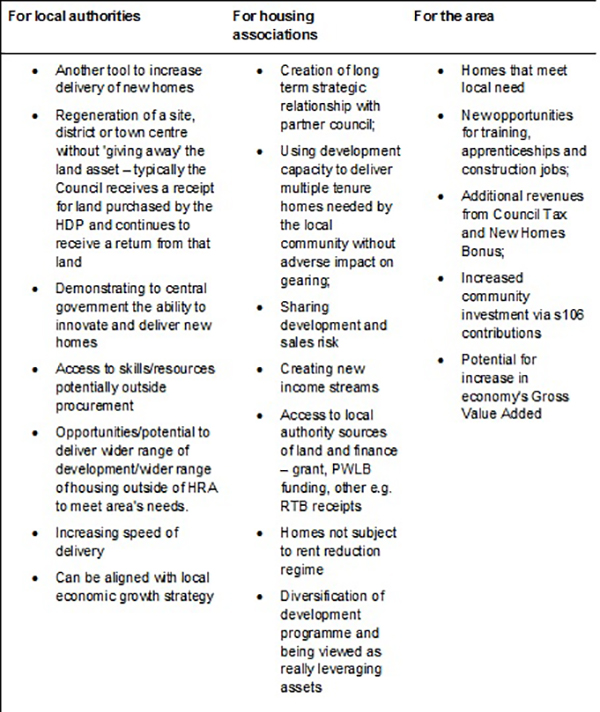Could Housing Delivery Partnerships be the new model to solve the housing crisis?
Tonia Secker explains the latest housing joint venture - the Housing Delivery Partnership.
Housing Delivery Partnerships (HDPs) are the new hot topic. Bespoke joint venture vehicles created between local authorities and housing associations or private developers to deliver additional housing supply designed to meet local need – what form do they take, what can they do and why might you consider them?
Just as there is no silver bullet to solve the housing crisis, there is no "one size fits all" joint venture model, but a structure which is flexible enough to be adapted to a number of circumstances and which is coming to exemplify the HDP, is that of a limited liability partnership (LLP) between a local authority and a housing association.
Typically created on a project specific basis, the model operates to allow the partners to combine land, equity and expertise within the HDP to acquire and develop a locally focussed housing offer – sharing both the commercial risk and reward of the venture on a 50/50 basis. The HDP acts as developer and often as long term landlord, delivering against an agreed business plan (incorporating an agreed level of projected return), passing the profits from the project back to its partners in the form of sales receipts and/or revenue returns derived from rental income.
The HDP is intended to generate a return, but it also offers an opportunity for the local authority and housing association to work together to secure housing that the area needs and which the market would not, left to itself, provide. For example, the HDP developed between Brighton and Hove City Council and Hyde Housing Group will deliver local living wage rented homes targeted at working households for which there are inadequate suitable local housing options.
The diagram shows potential structural and funding options, with the key relationship shaded. The powers relied upon by the local authority (LA) to participate in the venture will influence whether it can be a member of the LLP itself or must use a subsidiary company. In the latter case, an authority’s own local housing company would usually fit the bill.
The LLP structure offers certain advantages – it is designed for partnership working; is tax transparent and, if structured correctly, will keep the financing and project liabilities off the partners’ balance sheets, allowing them to use their debt capacity for other projects and, in the case of the housing association (HA) partner, not adversely affecting its gearing. From a local authority perspective, the ability of the arrangement to convert capital to long term revenue is increasingly attractive as central government grant disappears.
What about procurement – the elephant in the room? Entry into an LLP agreement for the purposes of investing in housing provision falls outside of the scope of the EU procurement regime. What about the LLP itself? The answer will be case specific - analysis of its nature and activities will determine whether it is a "contracting authority" for the purposes of the procurement regulations.
The HDP is not intended to be registered with the HCA and, as a result, properties developed by it would sit outside of the HCA’s regulatory regime and the scope of the rent reduction regime established by the Welfare Reform and Work Act 2016.
Whilst capable of attracting commercial debt, the HDPs which we have advised on to date have not gone to the market – preferring to minimise potential financing costs and using instead a combination of Public Works Loans Board (PWLB) funding and equity contributions to finance their operations. A particular advantage which the HDP offers local authorities is that, unlike their wholly owned local housing companies, it can receive their available RTB receipts, reducing overall development costs whilst still affording them (in their capacity as partner of the HDP) influence in the manner in which they are applied.
Beyond the "technical" benefits identified above, what other advantages does the HDP offer?
Government has laid down a challenge to LAs and HAs to innovate and collaborate more closely and there is an understanding across the sector that no-one class of provider has the capacity to deliver at the volumes necessary to hit the government’s 275,000 – 300,000 homes pa target. For HAs and LAs, operating in the same local economies, risk sharing with a partner with similar social values can represent a sensible investment strategy whilst allowing restricted funds and assets to be worked to greater effect. For those willing to do so, the HDP is a model worth considering.
Tonia Secker is head of housing at Trowers and Hamlins
RELATED




